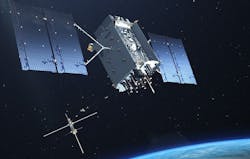Newly launched GPS III satellite responding to commands, under self-propulsion
DENVER, Colo., - The U.S. Air Force's second next-generation GPS III satellite, built by Lockheed Martin, is responding to commands, under control and now using its own internal propulsion system to get to orbit following its successful launch.
At about 11:01 a.m. Eastern time on August 22, Air Force and Lockheed Martin engineers at Lockheed Martin's Launch & Checkout Facility near Denver declared they had full control of GPS III Space Vehicle 02 (GPS III SV02) shortly after the satellite's separation from its United Launch Alliance (ULA) Delta IV rocket booster. The satellite, nicknamed "Magellan" by the Air Force, began its rocket ride to space with a 9:06 a.m. ET launch from Cape Canaveral Air Force Station.
GPS III SV02 climbed towards its operational orbit about 12,550 miles above the earth under the power of its own Liquid Apogee engines. Engineers at Lockheed Martin Space's Waterton, Colorado facility are commanding the satellite using elements of the GPS Next Generation Operational Control System (OCX) Block 0.
"GPS III SV02 is receiving and responding to commands just as planned. In the days ahead, we'll finish orbit raising to our operational slot and then send the satellite commands telling it to deploy its solar arrays and antennas," said Johnathon Caldwell, Lockheed Martin Space's Vice President for Navigation Systems. "Once we are set up, we'll begin on-orbit checkout and tests, including extensive signals testing with our advanced navigation payload."
GPS III SV02 is the second GPS III satellite designed and built by Lockheed Martin to help the Air Force modernize today's Global Positioning System (GPS) constellation with new technology and capabilities. GPS III satellites provide 3x greater accuracy and up to 8x improved anti-jamming capabilities. GPS III also provides a new L1C civil signal, compatible with other international global navigation satellite systems, like Europe's Galileo.
For additional GPS III information, please visit www.lockheedmartin.com/gps.
